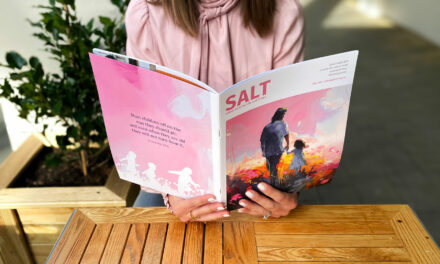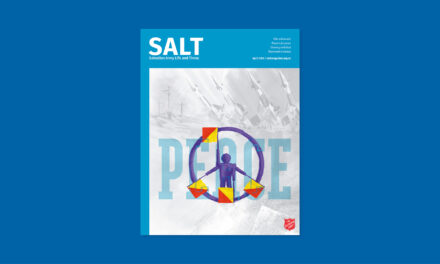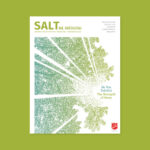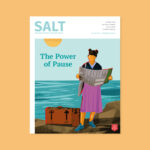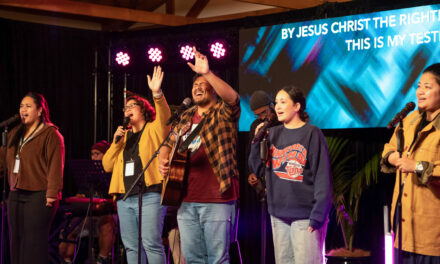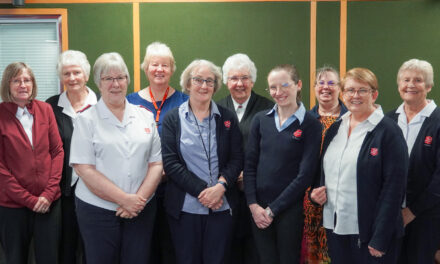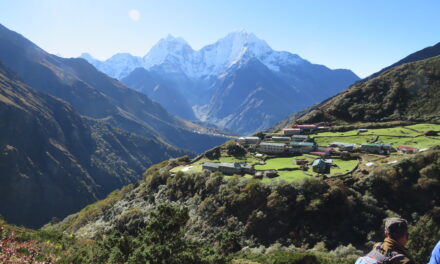
A Risky Faith
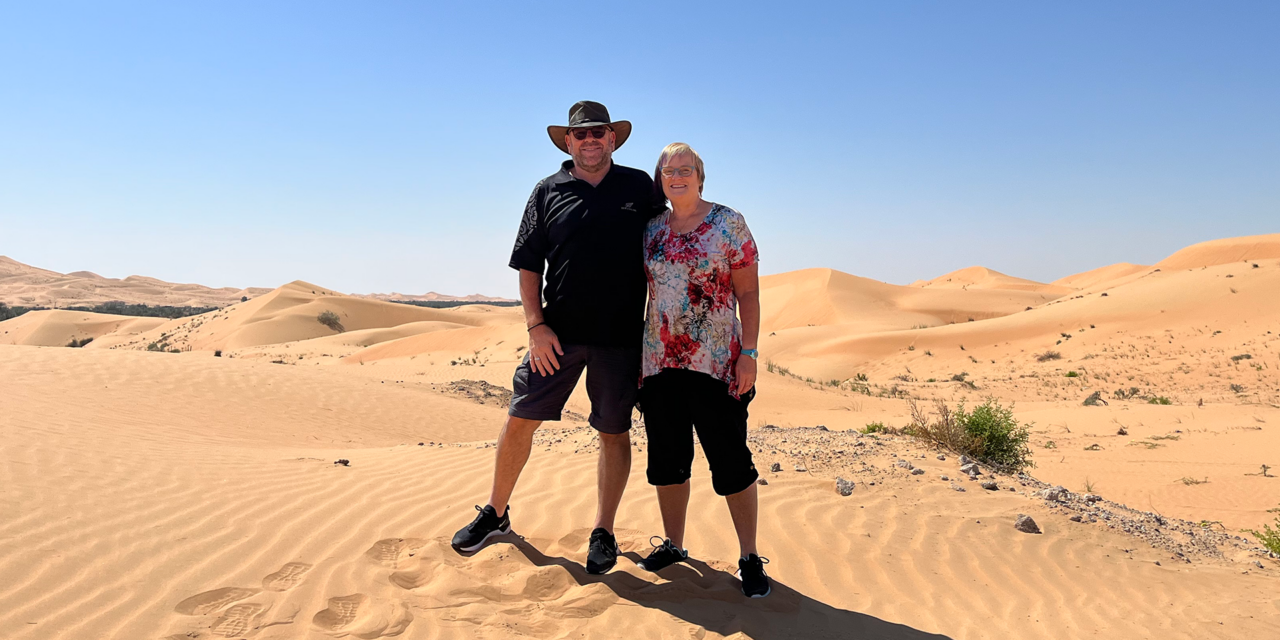
Captains Doug and Janet Newman are the regional leaders of The Salvation Army in the Middle East. On their recent return to New Zealand for homeland furlough, the couple spoke to SALT about the challenges and opportunities of serving in a region where it is illegal to publicly express Christian faith.
‘When you are used to having total freedom of expression around who you are in Christ, and then you come and live in a country where any expression of Christian faith puts you at risk of being arrested by the religious police—well, it puts things in perspective,’ says Doug.
‘The very fact that we are able as Christians to be in these countries, let alone worship and minister, is huge,’ explains Janet. ‘Yes, there are very specific and strict guidelines we must adhere to, but for The Salvation Army to have a presence here … I can’t stress how incredible it is.’
Doug and Janet live in Kuwait, where regional headquarters for the Middle East is situated. They are also the corps officers for Kuwait Corps (church) and the couple have direct oversight of the burgeoning work in the Kingdom of Bahrain. Doug and Janet have regional responsibility for three corps in the United Arab Emirates (UAE) and three corps in Oman. The latter are led by regional assistants—South African officers, Majors Jeff and Margaret Stafford. The two couples make up the officer force for the entire Middle East Region.
Geographically, it’s a complex operation. ‘The UAE is thought of as a country’, explains Doug, ‘but it is actually a collection of seven separate emirates with a federal system where each emirate has their own rules but, collectively, they form a block known as the UAE. The work in Kuwait and Bahrain sees eight corps in eight Islamic countries, which is just amazing. In Qatar—between Bahrain and the UAE—where the FIFA World Cup was held, there is currently an expansion project to officially recognise a corps there. And we recently had Salvationists who are working in Saudi Arabia reach out for spiritual support.’
Same but different
In Kuwait, Christian leaders and pastors can no longer access religious residence visas. In fact, two and a half years ago the government reduced the number of religious visas from 80 down to 18. Doug explains that there have been multiple requests to reverse this, but the government can’t see the need with so many Christians in the country already.
‘It’s easy to understand why when you consider that Muslims worship together at the local mosque—the closest one to where they are at any given time. So, Christians wanting visas to worship separately in their denominations makes no sense to them. “Why can’t you worship together? Aren’t you all one?” They don’t understand the breadth of Christian theology, belief and practice—it’s a bit of a mystery to them and a challenge for us,’ explains Doug.
Kuwait Corps meets in a sanctioned church compound. ‘We are sponsored under the National Evangelical Church of Kuwait (NECK) and each congregation meets in a hall within the compound and is allocated a time slot. For some time now, The Salvation Army in Kuwait has met at 7pm on a Saturday evening. We have two rooms, one for church and one for children’s church, and we only have them for two hours which is very limiting. But we cannot meet in our house—that is illegal,’ explains Janet.
Dangerous liaisons
The subtle differences between countries in the Middle East mean that Doug and Janet must be highly adaptable, and very careful. All eight countries are Islamic, with each one having different government systems, so what Doug and Janet can and can’t do—and how they do it—changes as they move between countries. For example, the wearing of Salvation Army uniform can be dangerous in some countries, and not an issue in others.
‘In Kuwait we don’t wear our more military-style uniforms with white shirt and epaulettes unless we are in the church compound, because it’s a safety issue. It’s about how “army” is seen and recognised,’ says Janet. ‘The only uniformed people in Kuwait are the Ministry of Interior—the police. So, our soldiers in Kuwait will cover their epaulettes when outside or not put them on at all until they are safely inside,’ explains Janet. Red Shield branded business shirts and polo tops are the go-to for Doug and Janet when moving around Kuwait.
‘There is no Arabic word for salvation—not salvation as we understand it,’ says Doug. ‘And while there is certainly understanding of the word ‘army’, it has very bad connotations. There is even a registered terrorist group called The Salvation Army! It’s not big, but it’s there. So, we are in the process of trying to work out—as has been done in other countries in the Army world—an appropriate identifier for us.’
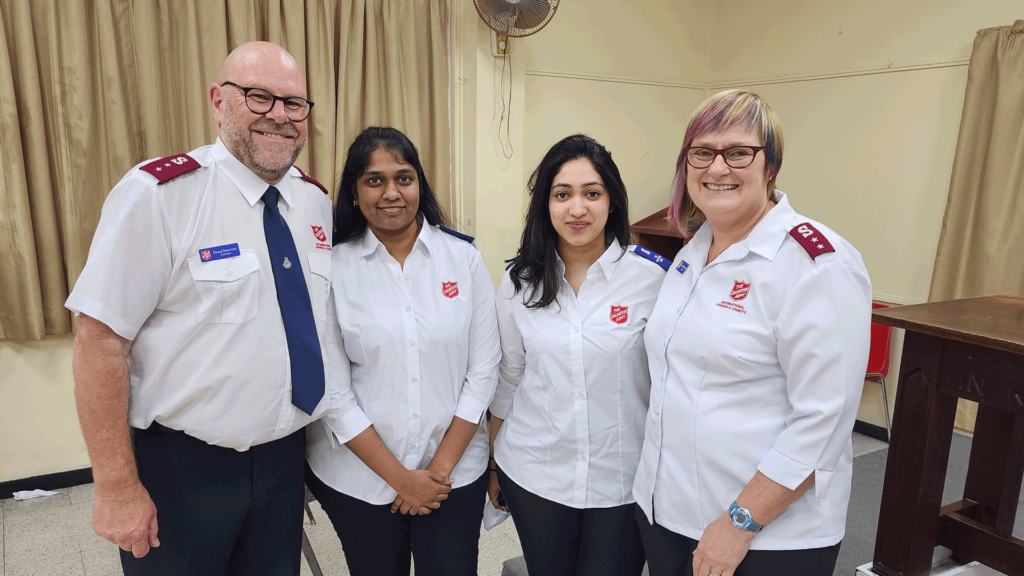
Kingdom come
It’s a very different story for The Salvation Army in the Kingdom of Bahrain. In March, eight new soldiers were enrolled at Bahrain Corps (pictured over the page). ‘Our main goal for 2023 is to expand the work there, and God is opening doors for us,’ says Doug.
Last year Doug was made aware of a conversation that had taken place between someone from The Salvation Army’s International Social Justice Committee (ISJC) and the under-secretary for political affairs with the Ministry of Foreign Affairs. It was mentioned that The Salvation Army is in over 130 countries, with the response being: ‘Why aren’t you in Bahrain?’ Doug wrote to the under-secretary and secured an invitation to meet with him and other officials.
‘His Excellency expressed a desire that we become an independent church in Bahrain, rather than just a sponsored group under the Anglican umbrella. Bahrain would be the first country in the Middle East to officially recognise The Salvation Army, and they agreed to support us with a roadmap of how to become independently registered,’ explains a very excited Doug. ‘They want us to move our regional headquarters to Bahrain and for that to become the centre for Salvation Army operations in the Middle East. Bahrain is the most progressive, multi-cultural, multi-faith country in the Middle East. There are even Jewish synagogues, and we can wear full Salvation Army uniform in Bahrain.’
Janet is also excited by the possibility of being able to have a church building. ‘We could establish a base and have a home church. We could also do some form of Community Ministries and set up a Family Store-type business, so The Salvation Army would have a community presence.
‘We would of course need more officers. We can’t leave Kuwait without leadership because it is the biggest corps in the region with a roll of around 135,’ explains Doug.
Mission to the marginalised
The Salvation Army in Kuwait, like elsewhere in the Army world, is about mission to the marginalised. In Kuwait that means going into the deportation centres. Kuwait has a population of five million, with 1.2 million being Kuwaitis, and the rest ex-pats from around the world who have come for work. But there are things that can and do go wrong. If someone’s visa becomes invalid or they lose their employment, they can find themselves arrested for being in the country illegally and sent to the deportation centre. Janet is very passionate about this ministry of encouragement to isolated Christians, as well as the opportunity to share the gospel with other detainees.
‘There are three large rooms with bed bunks—200 women per room—waiting to be deported,’ explains Janet. ‘They are waiting for processes to be completed like the purchasing of tickets to go home which can take months. They have no cellphones or contact with the outside world—no family, no one. It is a very bleak place. We go in and try to bring a bit of light, and when we arrive often the women have tears in their eyes because they know they haven’t been forgotten. The Christians get called forward and we pray and worship and share the Word, with everyone else in the background listening—you just never know what they might take in! We also take in clothes, and money so they can buy shampoo. At Christmas it’s winter warmth packages because it gets very cold.’
Called to prayer
There are churches in every community here in New Zealand, but in Kuwait there are mosques everywhere. The key difference in terms of daily spiritual life are the calls to prayer that ring out from loudspeakers across the city. There are five in a 24-hour period.
‘It is quite a melodious voice,’ says Doug. ‘There are prayer rooms all over the place, including the malls. Everyone knows when those prayer times are, so it’s not a surprise to anyone. Some of the smaller neighbourhood shops will just pull the door down for prayers and the shop empties out.’
‘Friday is holy day and midday prayers are the most important of the week,’ explains Janet. ‘Outside our house we get people lined up to pray, two to three people deep on the side of the road.’
‘We have become so very aware of the Muslim commitment to prayer—to their faith. Puts us to shame really,’ says Doug. ‘But on the flipside, whenever I hear the call to prayer, I use it as a reminder to pray. As Christians we don’t need specific times to pray, and
like other Christians I have ongoing conversations with God while walking up the stairs or emptying the bins. But that specific regular call to prayer is an opportunity—a reminder to be very specific in prayer.’
Janet adds, ‘Going through the season of Ramadan last year I couldn’t help but think wow, these guys are so committed.’
Basking in the familiar
Doug and Janet have enjoyed being back in New Zealand for a short period. ‘It’s been great to just bask in the familiar,’ says Doug, who couldn’t wait to eat a pepper steak pie from the BP service station! For Janet it was lollies, pork and being able to speak fast. Both agree it’s been great to see family and friends … and rest. But both Doug and Janet are understandably excited about the ministry and mission waiting for them as they return to the Middle East for their second year as regional leaders.

